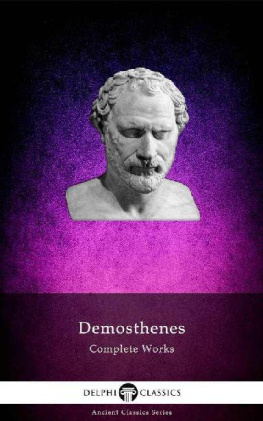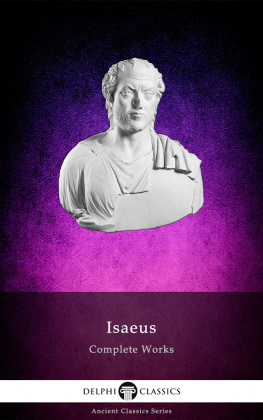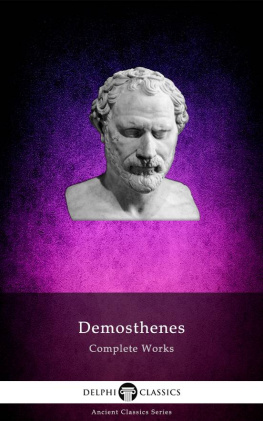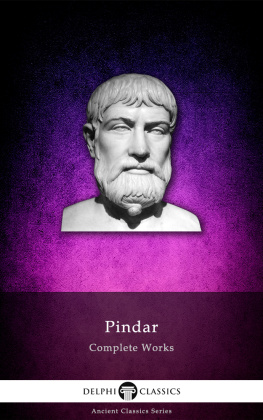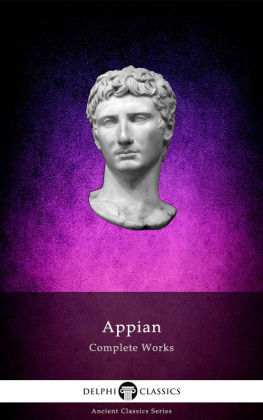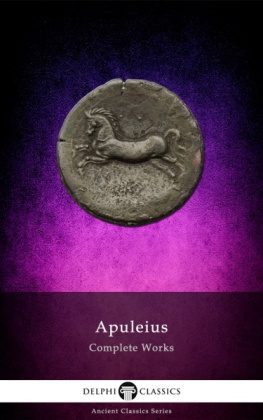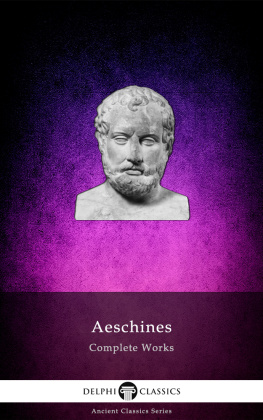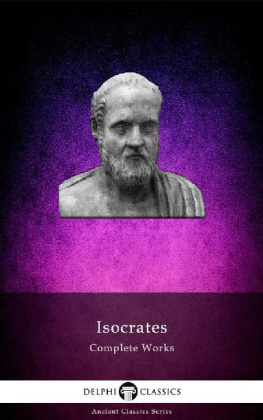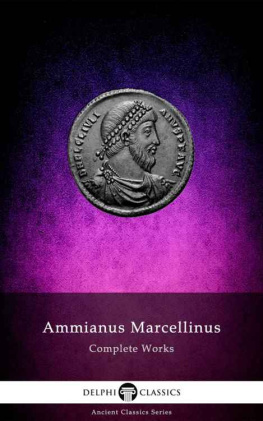The Complete Works of
DEMOSTHENES
(384322 BC)

Contents

Delphi Classics 2015
Version 1

The Complete Works of
DEMOSTHENES

By Delphi Classics, 2015
COPYRIGHT
Complete Works of Demosthenes
First published in the United Kingdom in 2015 by Delphi Classics.
Delphi Classics, 2015.
All rights reserved. No part of this publication may be reproduced, stored in a retrieval system, or transmitted, in any form or by any means, without the prior permission in writing of the publisher, nor be otherwise circulated in any form other than that in which it is published.
Delphi Classics
is an imprint of
Delphi Publishing Ltd
Hastings, East Sussex
United Kingdom
Contact: sales@delphiclassics.com
www.delphiclassics.com
The Translations

Ancient Athens Demosthenes was born in 384 BC, during the last year of the 98th Olympiad or the first year of the 99th Olympiad.

The Naos Zoodochos, in the centre of Paeania Demosthenes father, who belonged to the local tribe, Pandionis, and lived in the deme of Paeania in the Athenian countryside, was a wealthy sword-maker. Aeschines, Demosthenes greatest political rival, maintained that his mother Kleoboule was a Scythian by blood an allegation disputed by some modern scholars.
ON THE NAVY BOARDS

Translated by C. A. Vince and J. H. Vince
Demosthenes first political oration was delivered in 354 BC, at a time when the Athenian Assembly had convened to consider a rumoured threat against Athens by the Great King of Persia, Artaxerxes Ochus. In On the Navy Boards , the orator urges his fellow citizens towards moderation, advocating the need to avoid any provocation. Nevertheless, Demosthenes proposes a well-organised preparation in case of war. For this reason he supports the reform of the symmoriai (boards) through which the Athenian fleet was funded. Unfortunately, in his first political intervention the young politician did not accomplish his goals.
Some of the themes that recur continually in Demosthenes later speeches are prominent in On the Navy Boards , including the futility of rhetorical appeals to past glories, without readiness for personal service, and the need of a thorough organisation of the forces. Although the speech indicates signs of a stilted, over zealous preparation, it demonstrates a characteristic mastery of minute detail that would become a hallmark of the orators later masterpieces.

Bust of Demosthenes, Louvre, Paris

Artaxerxes III Ochus (c. 425 BC 338 BC) of Persia,as depicted on his Tomb at Persepolis.
ON THE NAVY-BOARDS
Those who praise your ancestors, men of Athens, seem to me to choose an acceptable theme, which yet fails to do any real service to those whom they eulogize; for when they attempt to speak about achievements to which no words could possibly do justice, they earn for themselves the reputation of clever speakers, but leave their hearers with a lower estimate of the merits of those famous men. Indeed, I think the best testimony to their merits is the length of time that has elapsed, during which no other men have been able to surpass their achievements. [2] For my own part, however, I shall confine myself to pointing out how you can best prepare for war. For this is how things stand. Even if all of us who are to address you should prove capable speakers, you would, I am sure, be no better off; but if someone, whoever he may be, could come forward and point out convincingly the nature and size of the force that will be serviceable to the city, and show how it is to be provided, all our present fears will be relieved. This is what I will try to do, if only I am able, first giving you briefly my views about our relations with the Great King. [3]
I admit that he is the common enemy of all the Greeks; yet I would not on that account advise you to undertake a war against him by yourselves apart from the rest, for I observe that the Greeks themselves are by no means common friends of one another, but that certain of them repose more confidence in the King than in some of their neighbors. From this state of things I conclude that it is to your interest to be careful that your grounds for entering on war shall be equitable and just, but to proceed with all the necessary preparations, making that the foundation of your policy. [4] For I believe, Athenians, that if there were clear and unmistakable signs of the Kings hostile intentions, the other Greeks would join with us, and would be deeply grateful to those who would stand up for them and with them against his attacks; but if we force on a war, while his aims are still obscure, I am afraid, men of Athens, that we shall be obliged to encounter, not only the King, but also those whom we are minded to protect. [5] For the King, suspending his designs if he really intends to invade Greece will distribute money among them and tempt them with offers of friendship, while they, anxious to bring their private quarrels to a successful issue and keeping that object in view, will overlook the common safety of all. Into such a welter of confusion and folly I beseech you not to plunge our country. [6] For indeed, as regards your policy towards the King, I see that you are by no means on the same footing as the other Greeks; for many of them it is, I suppose, possible to pursue their private interests and abandon the cause of their countrymen, but for you, even when wronged by them, it would not be honorable to exact such a penalty from the wrong-doers as to leave any of them under the heel of the barbarian. [7] But as long as this is so, we must take care that we are not involved in war at a disadvantage, and that the King, whom we believe to have designs against the Greeks, does not win the credit of appearing as their friend. How then can this be ensured? If we make it plain to all that our forces are already marshalled and equipped, but equally plain that our policy is founded on sentiments of justice. [8] To your rash advisers, who are so eager to hurry you into war, I have this to say, that it is not difficult, when deliberation is needed, to gain a reputation for courage, nor when danger is at hand, to display skill in oratory; but there is something that is both difficult and essential to display courage in the face of danger, and in deliberation to offer sounder advice than ones fellows. [9] I believe, men of Athens, that the war with the King is a difficult undertaking for our city, though any conflict which the war involved might prove easy enough. Why so? Because the first requisites for every war are necessarily, I suppose, fleets and money and strong positions, and I find that the King is more fully supplied with these than we are; but for the actual conflict I observe that nothing is needed so much as brave soldiers, and of these we and those who share the danger with us have the better supply. [10] That is why I advise that we should not on any grounds be the first to plunge into war, but for the conflict we must be properly equipped from the start. If indeed there were one kind of force suitable for defence against Persians and another for defence against Greeks, then we might reasonably be suspected of marshalling ourselves against the King; [11] but when all preparation for war is on the same lines and the main objects of an armed force are the same to be strong enough to repel the enemy, to assist ones allies, and to preserve ones own possessions-why, having open enemies enough, must we be looking out for another? Let us rather make our preparations against them, and then we shall defend ourselves against him too, if he ventures to molest us. [12] Moreover you are now calling on the Greeks to join you; but if you refuse to do their bidding and your relations with some of them are not cordial how can you expect any of them to answer your call? Because, you say, we shall warn them that the King has designs on them. But seriously, do you imagine that they cannot detect that for themselves? I am sure they can. But as yet their fear of Persia is subordinate to their feuds with you and, in some cases, with one another. Therefore your ambassadors will only go round repeating their heroics. [13] But later on, if what we now deem probable comes to pass, surely no Greek community has such a good conceit of itself that when they see that you have a thousand cavalry and as many infantry as one could desire and three hundred ships, they will not come as our suitors, feeling that with such support their safety is assured. Therefore to invite them at once means that you are the suppliants and, if unsuccessful, have failed utterly, but to wait and at the same time complete your own preparations means saving them at their request, and being well assured that they will all join you. [14]
Next page
